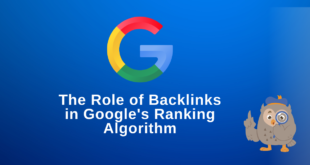Understanding how Google’s algorithm determines search rankings is crucial for any website owner or digital marketer. Google’s ranking system consists of a variety of factors that influence the visibility of a webpage.
Optimizing for these factors can significantly enhance your chances of ranking higher in search results. This article will break down the most critical elements of Google’s algorithm and provide actionable strategies to improve your site’s rankings.
How Google’s Algorithm Determines Search Rankings
Google’s algorithm is highly sophisticated, using over 200 ranking factors to evaluate websites. At the core of Google’s ranking system is its ability to analyze content, user behavior, and website quality. While no one outside Google knows the exact formula, several key factors consistently emerge as the most important.
Content Quality and Relevance
Content quality is arguably the most important factor when determining search rankings. Google’s algorithm favors websites that provide valuable, relevant information to users. High-quality content is informative, well-structured, and optimized for the target keyword—like “How Google’s Algorithm Determines Search Rankings.” It’s important to focus on delivering engaging, original content that directly answers users’ search queries.
Keyword Optimization
While Google’s algorithm has evolved to rely less on keyword frequency, it still plays a role in determining search rankings. Properly optimized keywords, when used naturally and strategically, help Google understand the content’s topic. Ensure that your primary keyword, such as “How Google’s Algorithm Determines Search Rankings,” is included in your content without keyword stuffing.
How to Use Keywords Effectively
Using keywords effectively involves incorporating them in title tags, meta descriptions, header tags, and throughout the body of your content. A 2% keyword density is ideal for ensuring that your target keyword is prominent without triggering spam signals. Tools like Google Search Console can help you monitor keyword performance and adjust your content strategy accordingly.
Backlinks and Their Influence
Backlinks remain one of the most influential ranking factors for Google. The quality and quantity of backlinks to your site indicate to Google that your content is trustworthy and authoritative. For instance, if your site is linked from high-authority pages such as in this guide on ranking factors, it significantly boosts your chances of ranking higher.
Harning High-Quality Backlinks
Obtaining backlinks from relevant and reputable sources is critical for improving your Google ranking. These can include guest blogging, creating shareable content, or even engaging in partnerships with industry influencers. According to this article on the impact of backlinks, effective backlink strategies can improve your site’s authority and search engine performance.
Mobile Optimization
In the era of mobile-first indexing, ensuring that your website is mobile-friendly is essential for ranking well on Google. Websites that provide a seamless mobile experience rank higher because they cater to the majority of online users, who access the internet via mobile devices. Make sure your site’s design is responsive, loads quickly, and provides an excellent user experience on smartphones and tablets.
Page Speed and Technical SEO
Google’s algorithm also considers technical SEO elements, including page speed, secure HTTPS protocols, and proper use of HTML tags. A fast-loading website not only improves the user experience but also signals to Google that your site is well-maintained and efficient. Websites that experience delays or technical errors may struggle to rank well, even if the content is high quality.
How to Improve Your Page Speed
Several strategies can help enhance your site’s speed. First, optimize images and compress large files. Additionally, utilizing browser caching and enabling content delivery networks (CDNs) can dramatically reduce load times. Tools like Google PageSpeed Insights provide detailed recommendations to further boost site speed.
User Experience and Engagement Metrics
Google closely monitors how users interact with websites to determine search rankings. This includes metrics such as bounce rate, dwell time, and click-through rate (CTR). Websites that engage users and keep them on the page for longer tend to rank higher. If visitors frequently leave your site shortly after arriving, Google interprets this as a sign that your content isn’t meeting users’ expectations.
Enhancing User Engagement
Creating interactive and visually appealing content can help improve user engagement. Consider adding videos, infographics, and quizzes to keep visitors interested. Additionally, optimizing your site’s structure and internal linking strategy can help users easily navigate your content, leading to longer dwell times and lower bounce rates.
The Role of AI in Google’s Algorithm
Google has integrated artificial intelligence (AI) into its algorithm through systems like RankBrain and BERT. These AI components help Google better understand user intent, which is critical for delivering more relevant search results. RankBrain, for example, analyzes how users interact with the search results and adjusts rankings accordingly.
Optimizing for RankBrain and AI Algorithms
To optimize for AI-driven algorithms like RankBrain, focus on creating content that aligns with user intent rather than solely targeting specific keywords. Google’s AI increasingly values context and the relevance of a webpage to the searcher’s query. Incorporate natural language and address common questions or problems your audience may have to align better with AI systems.
Structured Data and Schema Markup
Structured data helps Google’s algorithm understand the content on your website. By using schema markup, you can provide additional context about your pages, making it easier for search engines to categorize and rank your site. Structured data also increases the chances of earning rich snippets, which can improve your site’s visibility in search results.
Implementing Schema Markup
Schema markup is a form of microdata that you can add to your HTML. It doesn’t affect the visible content of your site but provides additional information to search engines. For instance, adding structured data to product pages, reviews, or blog posts can increase the likelihood of earning a featured snippet, which often ranks above organic search results.
Core Web Vitals and the Future of SEO
Core Web Vitals are a set of user-focused metrics that Google considers essential to delivering a great user experience. These metrics focus on the loading performance, interactivity, and visual stability of your website. Websites that perform well in these areas are more likely to rank higher.
Optimizing for Core Web Vitals
To optimize for Core Web Vitals, ensure that your website is not only fast but also stable and responsive. Tools like Google Search Console provide a Core Web Vitals report that can help identify areas for improvement, such as fixing layout shifts or reducing server response times.
FAQs About How Google’s Algorithm Determines Search Rankings
Q1: What are the most important factors that influence Google rankings?
The most critical factors include content quality, keyword optimization, backlinks, user experience, mobile-friendliness, and technical SEO elements like page speed.
Q2: How do backlinks affect search rankings?
Backlinks serve as endorsements from other websites, signaling to Google that your content is authoritative and valuable. High-quality backlinks from reputable sources can significantly boost your rankings.
Q3: Why is mobile optimization crucial for Google rankings?
With Google’s mobile-first indexing, websites that provide a seamless mobile experience are prioritized in search rankings. If your site isn’t mobile-friendly, you risk lower rankings and losing out on mobile traffic.
Q4: How does Google’s AI impact search rankings?
AI systems like RankBrain help Google better understand user intent, enabling more accurate search results. Optimizing content for user intent rather than focusing solely on keywords can improve rankings in AI-driven algorithms.
Q5: What are Core Web Vitals and why do they matter?
Core Web Vitals are performance metrics that measure a site’s loading time, interactivity, and visual stability. Google uses these metrics to assess the user experience, and they play a crucial role in determining search rankings.
By understanding and implementing these ranking factors, you can significantly improve your website’s chances of ranking higher on Google and attracting more organic traffic.
 High-Quality Backlinks for SEO Success | Backlink eStore
High-Quality Backlinks for SEO Success | Backlink eStore




